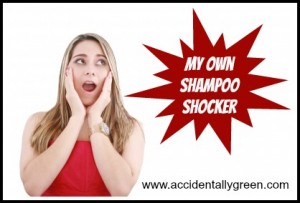This may be a Works for Me Wednesday post, but today I’m sharing something that doesn’t work for me. As I researched products for Monday’s shampoo blog post, I was shocked. One of the shampoos, rated a 6 (moderate hazard), was in my shower at that very moment.
Now, if I would have checked the list five years ago, I wouldn’t have been surprised to find a moderate hazard in my home. But this was an “organic” product. I thought I had done my research. I thought I was buying safe products.
Alas, I was wrong. My Nature’s Gate Chamomile & Lemon Verbena Shampoo was rated a moderate hazard because of its fragrance and lemon verbena flower extract.
Is it safe enough to use? Maybe. But because it scored a 6 and I’m more comfortable with anything up to a 4, I pulled it right out of my bathroom.
I have no idea what I’ll do with it now – maybe use it for a toilet cleaner? Or save it for traveling?
What this means
Aside from being totally shocked, I was reminded of a very important point: no one in the U.S. regulates a manufacturer’s advertising claims to be “all-natural” or “organic.” (Note: Organic food is regulated and labeled as USDA Organic.) So even when I bought a Nature’s Gate Organics shampoo, it ended up rankly poorly on Environmental Working Group’s Cosmetics Database. (Even one variety of EO Products shampoo was rated a 5 because it contains retinyl palmitate. And EO is a brand I highly trust.)
Just because something says “organic” doesn’t mean it’s safe. You still have to know what you’re trying to avoid – steering clear of phthalates and parabens is an excellent starting point.
Talk back
Even if you know many products include toxins and aren’t as natural as manufacturers may claim, are you still surprised to learn about potential hazards?

Latest posts by Hilary Kimes Bernstein (see all)
- The Day I Realized Healthy Choices Don’t Guarantee Health - July 21, 2015
- Avoid Synthetic Bug Sprays with All-Natural Repellents - July 16, 2015
- The Day I Learned I Could Cook Real Food - July 13, 2015



Actually, your claim that no one in the US regulates “organic” isn’t true. The USDA does regulate organic foodstuffs, however their requirements and allowable percentages are a great distance from what anyone would construe as stringent. Sadly there are even conferences farmers can go to to learn how to legally skirt requirements as well as apply bare minimums in order to still “win/earn” the organic label. Oregon Tilith is another certifying entity that actually helped define and create the organic movement. Their policies are more strict than the USDA. As for natural, the USDA actually has a definition for that, items can be declared all natural if most of the ingredients meet the criteria. HFCS is by definition natural. Also simply because something is natural or organic doesn’t mean it’s good for you. Belladonna, nightshade and foxglove are natural and poisonous. Organic means carbon based life form, such as plants, animals, people, etc. Doesn’t make a tiger, bear, or shark any less dangerous if it’s an organic carnivore. Those descriptive terms have no real meaning. Much better to use unprocessed whole ingredients or as you mentioned, know what you’re looking for.